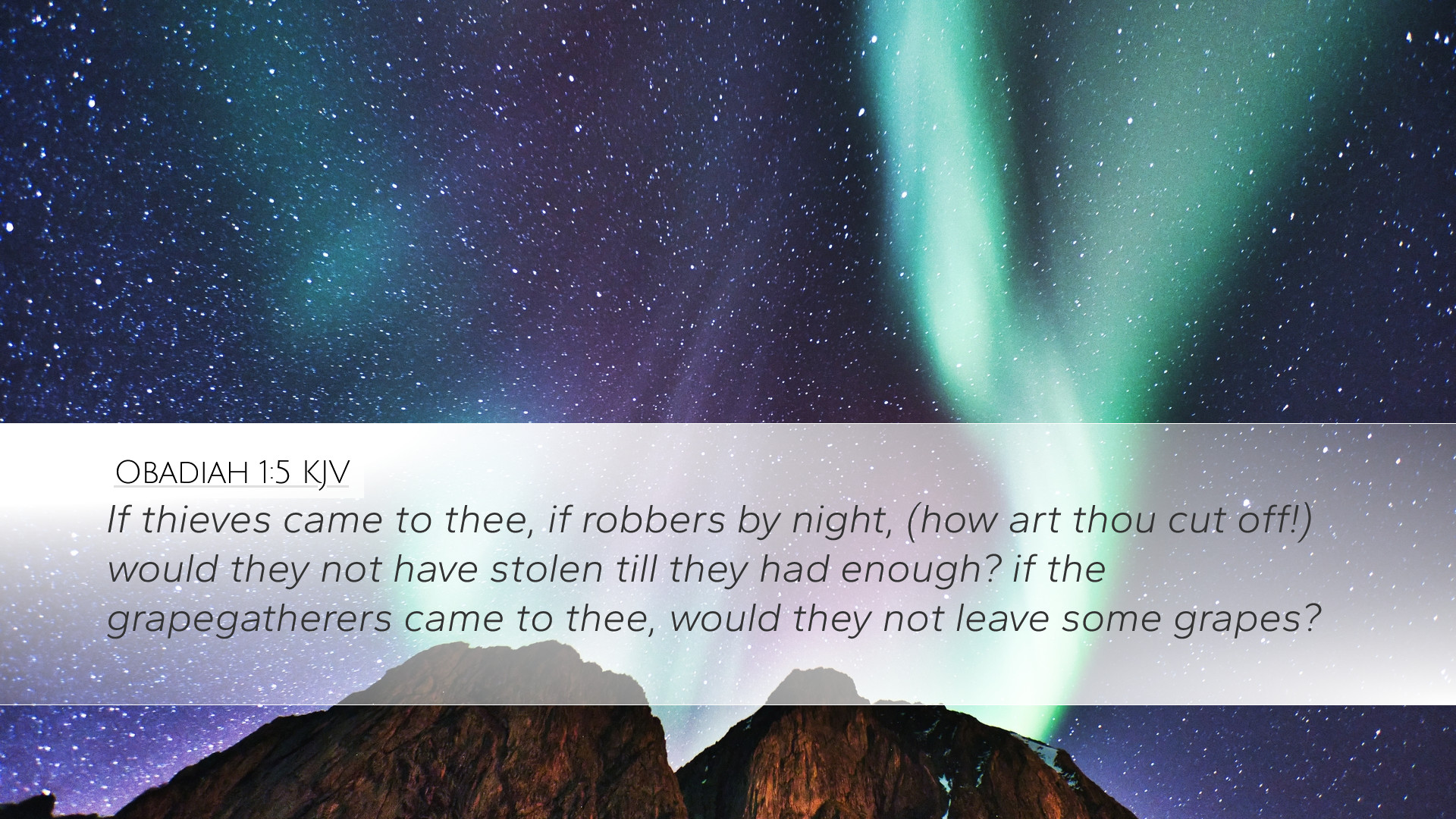Obadiah 1:5 - Commentary Summary
The verse states: "If thieves came to you, if robbers by night—Oh, how you will be destroyed!— Would they not have stolen until they had enough? If grape gatherers came to you, would they not leave some gleaning?" This verse serves to illustrate the completeness of the devastation that will befall Edom as a result of their pride and violence against Israel.
General Context
Obadiah, the shortest book in the Old Testament, is a prophetic work focusing on the judgment against Edom—a nation descended from Esau. The prophecy reveals divine disapproval of Edom’s actions during the Babylonian invasion of Jerusalem. Its implications extend beyond immediate historical context, reflecting themes of divine justice, pride, and the consequences of betrayal.
Insights from Commentaries
Matthew Henry
Henry emphasizes the viciousness of the attack on Israel by Edom and notes that the phrase "if thieves came" serves to highlight the unprecedented depth of their treachery. While thieves are typically constrained by a desire not to overreach, Edom’s punishment would be total, indicating a severe and unrestrained divine retribution. He draws attention to the metaphor of gleaning and suggests that even in theft, some mercy is shown (as thieves will only take what they can carry); Edom, however, will receive no such mercy.
Albert Barnes
Barnes elaborates on the metaphor of grape gatherers, suggesting that it illustrates the selective nature of human theft compared to God's judgment against Edom. He questions what motivates Edom’s actions. Unlike mere thieves, who act out of greed, Edom’s attack shows a deep-seated hatred toward their brother nation of Israel—a trait born from their ancestral struggle dating back to Jacob and Esau. This family feud culminates in inevitable divine judgment, thus marking the completeness of Edom’s failure.
Adam Clarke
Clarke's commentary focuses on the strong language used in the verse. He argues that the rhetorical questions posed serve to underline how different Edom's fate was compared to a common theft scenario. Clarke points out the hyperbolic nature of the prophecy, suggesting that Edom would suffer such considerable loss that it would surpass the loss typically experienced at the hands of thieves. He posits that the verse exposes the heart of why the judgment was so severe: Edom's pride and lack of humanity in failing to show compassion to a suffering nation.
Theological Implications
This verse, while historical in nature, raises timeless questions regarding human behavior in light of God’s expectations. The nature of sin, especially pride and betrayal, is a recurring theme throughout scripture and is vividly demonstrated in the enmity between Edom and Israel. It speaks to the larger theme of accountability before God, showcasing that no transgression, whether individual or collective, escapes His evaluation.
Spiritual Application
- Warning Against Pride: Just as Edom's pride led to their downfall, individuals and nations today must remain vigilant against pride. A humble posture invites blessing, while pride brings ruin.
- Divine Justice: The certainty of God's justice is emphasized here, reminding believers that wrongdoing—especially betrayal of kin—will ultimately be judged, providing a call to integrity in relationships.
- Compassion in Trials: The exhortation to remember those in distress can be derived from Israel's plight. The faithful are reminded to love their neighbors, embodying compassion rather than indifference.
Conclusion
Obadiah 1:5 serves as a powerful reminder of the depths of betrayal and the certainty of divine judgment. Through rich illustrations, the prophetic text exposes the raw reality of sin and its consequences while calling contemporary readers to reflect on their own lives. Pastors, students, theologians, and Bible scholars will find profound wisdom in its brevity, offering insights into the nature of humanity and the unwavering justice of God.


